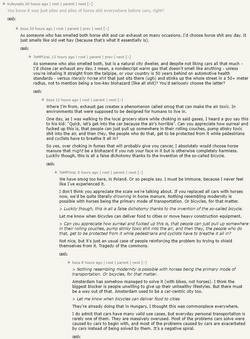Here's another roundup of dumbfuckery, some quite old by now. Something that particularly pisses me off when looking at these fools is their insistence that program correctness be a myth, or undesirable for some other reason; this isn't only false and annoying, but deeply stupid, and reminds me of how some of them cry about being unable to make a living unless they can charge rent for tools forever. Anyway, here's one instance:
https://news.ycombinator.com/item?id=38821708 (
archive)
Now I quite like decision tables and related methods; I believe them to be one of the best ways to write software which is easily proven correct. However, here's a
Hacker News user who must come up with a deranged example against this idea to excuse his incompetence:

This entire conversation is these losers bemoaning their incompetence:
https://news.ycombinator.com/item?id=39342143 (
archive)
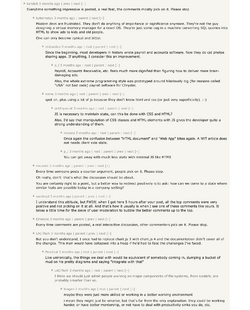
The pattern generally goes like this:
I can't do it, because of bureaucracy; none of my personal projects exhibit it, because I don't feel like it; I've never once displayed it in my life, but I could totally do it!
It's pathetic. Still, pathetic is funny.
This entire thread is worth a read, and I don't even mean to mock them here, necessarily:
Ask HN: What is the most useless project you have worked on?
https://news.ycombinator.com/item?id=39942397 (
archive)
Here's another banned user on Lobsters:
https://lobste.rs/~rednafi (
archive)
Joined: 9 months ago by invitation from polyrand
Banned: 2 months ago by pushcx: Ignored mod warning to stop self-promo for a while.
I believe this to have been his penultimate post:
https://lobste.rs/s/5xfopz/things_you_can_do_on_your_personal_website#c_bvww5b (
archive)
This is indeed fun. However, I do suggest that folks focus on the content as well.
I see a ton of blogs everywhere with one entry about how the blog was built and nothing else. Then, a few years later, the author rebuilds the site in another technology and adds another entry to the blog.
I’d like to see a lot more technical and non-technical content from individuals on their own platforms, not on Twitter, Facebook, Medium, Hashnode, or Dev.to.
I love writing on my own site, and the process has been paramount in my journey to continuously pick up new things and delve deeper into topics that I find interesting but don’t get to use in my job.
Here’s a glimpse:
https://rednafi.com
For reference, the user
andyc (
archive) still posts incessantly about his UNIX shell work.
Walter Bright is still at it:
https://news.ycombinator.com/item?id=40174222 (
archive)

Free Software projects should be regulated like banks, but of course they shouldn't be paid for all of this or anything:
https://news.ycombinator.com/item?id=40267666 (
archive)
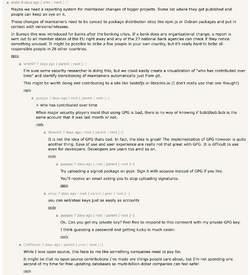
Paying T-Mobile employees more to make
sim-swapping less tempting totally won't work, because rich people also lie and steal:
https://news.ycombinator.com/item?id=40045093 (
archive)
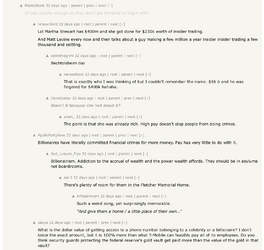
These are presented without comment:
https://lobste.rs/s/nyikhk/lessons_learned_after_3_years_fulltime#c_t9kluw (
archive)
 https://news.ycombinator.com/item?id=40385596
https://news.ycombinator.com/item?id=40385596 (
archive)
 https://news.ycombinator.com/item?id=39708347
https://news.ycombinator.com/item?id=39708347 (
archive)

Some Indians come up with a new way to take guesses, lauded as a new method of counting:
https://news.ycombinator.com/item?id=40379175 (
archive)
https://www.quantamagazine.org/computer-scientists-invent-an-efficient-new-way-to-count-20240516/ (
archive)
Personally, I dislike probabilistic methods, and view their overuse as similar to the nonsense with denying correctness as a concept. New methods to get exact answers are much more interesting.
An Apple Computers job listing in the hiring threads was found to be in violation of Californian law, but those comments have been removed by now, probably rotting at the end of the last page:
https://news.ycombinator.com/item?id=40224322 (
archive)
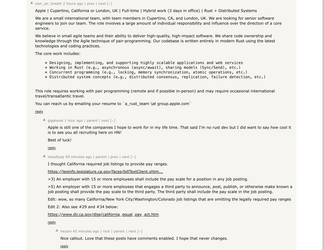
Fuck these assholes trying to dismantle language:
https://news.ycombinator.com/item?id=40315274 (
archive)
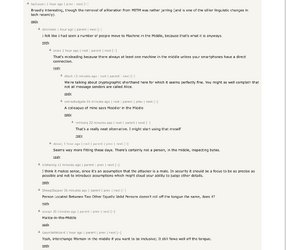
I'll kill a man before I start replacing
man in my language like this.
People who don't want to help Paul Graham drive down the value of labour can always find a reason not to:
https://news.ycombinator.com/item?id=40052184 (
archive)
https://twitter.com/paulg/status/1779930175574090094 (
archive)
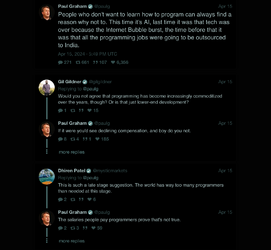
Amusingly, this was flagged.
Lastly, here's a funny argument about Indian accents everywhere:
https://news.ycombinator.com/item?id=38491238 (
archive)
We know how a white man would be treated if he were butchering some durka durka subhuman tongue, but the subhumans should just get to bastardize English, of course.
BTW @UERISIMILITUDO did you ever finish 'Designing an Internet'? You never reported back.
I was soon going to post about it, yes. I'm only in the seventh chapter so far, but that's the chapter containing the proposals for different architectures, which I've yet to finish. The book spends the first six discussing the ideas and making a taxonomy in which to evaluate networks, put simply, and I believe the remaining chapters dive deeper into certain categories in light of the proposed architectures and whatnot. I can easily recommend the book.
Most interesting, so far, is the Named Data Networking (NDN) proposal, an Information-Centric Network (ICN) design which manages to eliminate addresses entirely, effectively by having the routers remember the packets and their local source routes. Still, I get the impression this would make peer-to-peer harder or less natural, but I'm certain to look more into this design. Most like my thoughts, so far, is NewArch, a network designed to have no global identifiers with its Forwarding, Association, and Rendezvous Architecture (FARA) design; like many network proposals, it uses source routes, and tries to ensure they lack meaning others can see. I'd imagined a long bit string from which routers would lop off as needed, but this concept of source routes with explicit boundaries is probably overall better; I'd given little thought to what the end machine would do with a long address still, besides recursively routing to somewhere else, but one cool idea mentioned is basically using them like port numbers, without limitations, and so numbers such as process identifiers as an example, and the end program on the end machine could still route them further, I figure; it's a cool idea, and this book is helping me with my thoughts, by introducing me to the similar thoughts of those with much more experience and time to mull over their ideas.
